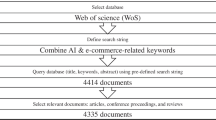Abstract
This study aims to investigate the psychological factors that motivate the mobile SNS users for the purpose of knowledge discovery. Based on the literature reviews, the authors selected sense of self-worth, knowledge self-efficacy, altruism, and self-verification as the motivating factors and attitude toward knowledge discovery and knowledge discovery behaviors as the dependent variables. The results show that only sense of self-worth was not significantly related to attitude toward knowledge discovery. The rest of the motivating factors are in conformance with what we predicted.




Similar content being viewed by others
References
Park ST, Li G, Hong JC (2018) A study on smart factory-based ambient intelligence context-aware intrusion detection system using machine learning. J Ambient Intell Humaniz Comput. https://doi.org/10.1007/s12652-018-0998-6
Park ST, Oh MR (2017) An empirical study on the influential factors affecting continuous usage of mobile cloud service. Clust Comput. https://doi.org/10.1007/s10586-017-1518-8
Cui X, Yang N, Wang Z, Hu C, Zhu W, Li H, Liu C (2015) Chinese social media analysis for disease surveillance. Pers Ubiquit Comput 19(7):1125–1132
Karahasanović A, Heim J (2015) Understanding the behaviour of online TV users. Pers Ubiquit Comput 19(5–6):839–852
Li G, Jung JR, Park ST (2018) Factors enhancing mobile social networking friendship maintenance: a study of alumni community on Wechat. Clust Comput 21(1):1127–1138
Bergman O, Yanai N (2018) Personal information retrieval: smartphones vs. computers, emails vs. files. Pers Ubiquit Comput 22(4):621–632
Song GY, Cheon Y, Lee K, Lim H, Chung KY, Rim HC (2014) Multiple categorizations of products: cognitive modeling of customers through social media data mining. Pers Ubiquit Comput 18(6):1387–1403
Statista (2019) Most popular social networks worldwide as of January 2019, ranked by number of active users, https://www.statista.com/statistics/272014/global-social-networks-ranked-by-number-of-users/. Accessed 6 Feb 2019
Guo M (2018) Kantar China social media impact report 2018. https://cn-en.kantar.com/media/social/2018/kantar-china-social-media-impact-report-2018/. Accessed 6 Feb 2019
iResearch (2019) http://report.iresearch.cn/content/2019/01/282673.shtml. Accessed 6 Feb 2019
CAICT (2018) Build an innovative community of shared ecosystem and foster new drivers of economic growth. WeChat Economic and Social Impact Report 2017. http://www.caict.ac.cn/kxyj/qwfb/ztbg/201805/P020180529380481819634.pdf. Accessed 6 Feb 2019
Mruk C (1995) Self-esteem: research, theory, and practice
Lin L, Wei S (2006) The investigation on managers’ time management disposition and self-worth [J]. Psychol Sci 1:015
Hater S (1985) The self-perception profile for children: revision of the Perceived Competence Scale for children manual. University of Denver, Denver
Gray-Little B, Hafdahl AR (2000) Factors influencing racial comparisons of self-esteem: a quantitative review. Psychol Bull 126(1):26–54
Keefe K, Berndt TJ (1996) Relations of friendship quality to self-esteem in early adolescence. J Early Adolesc 16(1):110–129
Bacro F (2012) Perceived attachment security to father, academic self-concept and school performance in language mastery. J Child Fam Stud 21(6):992–1002
Marsh HW, Trautwein U, Lüdtke O, Köller O, Baumert J (2005) Academic self-concept, interest, grades, and standardized test scores: reciprocal effects models of causal ordering. Child Dev 76(2):397–416
Bandura A (1986) Social foundation of thought and action: a social-cognitive view, Englewood Cliffs
Bandura A, Freeman WH, Lightsey R (1999) Self-efficacy: the exercise of control
Schwarzer R, Jerusalem M (1995) Generalized Self-Efficacy scale. In: Weinman J, Wright S, Johnston M (eds) Measures in health psychology: a user’s portfolio. Causal and control beliefs. NFER-NELSON, Windsor, pp 35–37
Li C, Shi X, Dang J (2014) Online communication and subjective well-being in Chinese college students: the mediating role of shyness and social self-efficacy. Comput Hum Behav 34:89–95
Bock GW, Zmud RW, Kim YG, Lee JN (2005) Behavioral intention formation in knowledge sharing: examining the roles of extrinsic motivators, social-psychological forces, and organizational climate. MIS Q 29(1):87–111
Condon P, DeSteno D (2011) Compassion for one reduces punishment for another. J Exp Soc Psychol 47(3):698–701
Rand DG, Peysakhovich A, Kraft-Todd GT, Newman GE, Wurzbacher O, Nowak MA, Greene JD (2014) Social heuristics shape intuitive cooperation. Nat Commun 5:3677
Zahra SA (2003) International expansion of US manufacturing family businesses: the effect of ownership and involvement. J Bus Ventur 18(4):495–512
Constant D, Kiesler S, Sproull L (1994) What’s mine is ours, or is it? A study of attitudes about information sharing. Inf Syst Res 5(4):400–421
Davenport TH, Prusak L (1998) Working knowledge: how organizations manage what they know. Harvard Business Press, Brighton
Wasko MM, Faraj S (2000) “It is what one does”: why people participate and help others in electronic communities of practice. J Strateg Inf Syst 9(2–3):155–173
Fehr E, Gächter S (2000) Fairness and retaliation: the economics of reciprocity. J Econ Perspect 14(3):159–181
Barclay P (2012) Harnessing the power of reputation: strengths and limits for promoting cooperative behaviors. Evol Psychol 10(5):868–883
Swann Jr WB (1990) To be adored or to be known? The interplay of self-enhancement and self-verification
Swann WB, Hill CA (1982) When our identities are mistaken: reaffirming self-conceptions through social interaction. J Pers Soc Psychol 43(1):59–66
Bagozzi RP, Yi Y (1988) On the evaluation of structural equation models. J Acad Mark Sci 16(1):74–94
Nunnally JC, Bernstein IH (1967) Psychometric theory, vol 226. McGraw-Hill, New York
Fornell C, Larcker DF (1981) Evaluating structural equation models with unobservable variables and measurement error. J Mark Res 18(1):39–50
Chin WW, Todd PA (1995) On the use, usefulness, and ease of use of structural equation modeling in MIS research: a note of caution. MIS Q 19(2):237–246
Falk RF, Miller NB (1992) A primer for soft modeling. University of Akron Press, Akron
Hoyle RH, Kenny DA (1999) Statistical power and tests of mediation. In: Hoyle RH (ed) Statistical strategies for small sample research. Sage, Newbury Park
Subramani M (2004) How do suppliers benefit from information technology use in supply chain relationships? MIS Q 28(1):45–73
Author information
Authors and Affiliations
Corresponding author
Additional information
Publisher’s note
Springer Nature remains neutral with regard to jurisdictional claims in published maps and institutional affiliations.
Rights and permissions
About this article
Cite this article
Li, G., Park, EM. & Jin, SJ. The impacts of personal traits on knowledge discovery behaviors via mobile SNS. Pers Ubiquit Comput 26, 395–406 (2022). https://doi.org/10.1007/s00779-019-01240-1
Received:
Accepted:
Published:
Issue Date:
DOI: https://doi.org/10.1007/s00779-019-01240-1



